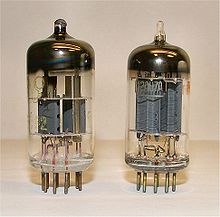12AU7
| 12AU7 | |
|---|---|
 RFT "thin-plate" ECC82 variant (left), RCA 12AU7A variant (right) | |
| Classification | Dual Triode |
| Service | Audio amplifiers and TV receivers |
| Height | 2+5⁄8 in (67 mm) |
| Diameter | 7⁄8 in (22 mm) |
| Cathode | |
| Cathode type | Coated Unipotential |
| Heater voltage | Series / Parallel 12.6 / 6.3 V |
| Heater current | Series / Parallel 150 / 300 mA |
| Anode | |
| Max dissipation Watts | 2.75 W per section |
| Max voltage | 300 V |
| Max current | 20 mA (maximum) |
| Socket connections | |
 | |
| References | |
| http://www.thetubestore.com/lib/thetubestore/eh-12au7eh.pdf | |
The 12AU7 and its variants are miniature nine-pin (B9A base) medium-gain dual-triode vacuum tubes. It belongs to a large family of dual-triode vacuum tubes which share the same pinout (RETMA 9A). 12AU7 is also known in Europe under its Mullard–Philips tube designation ECC82.[1] There are many equivalent tubes with different names, some identical, some designed for ruggedness, long life, or other characteristics; examples are the US military 5814A and the European special-quality ECC82 and E182CC.
The tube is popular in hi-fi vacuum tube audio as a low-noise line amplifier, driver (especially for tone stacks), and phase-inverter in vacuum tube push–pull amplifier circuits. It was widely used, in special-quality versions such as ECC82 and 5814A, in pre-semiconductor digital computer circuitry. Use of special-quality versions outside of the purpose they were designed for may not be optimal; for example, a version for digital computers may be designed for long life without cathode poisoning when mostly switched to low-current mode in switching applications, but with little attention to parameters of interest only for linear applications such as linearity of transfer characteristic, matching between the two sections, microphony, etc.
This tube is essentially two 6C4/EC90s in the same envelope. However, this latter type is officially described in manufacturer's data as "a special quality R.F. power amplifier or oscillator for frequencies up to 150 MHz".[2] The 12AU7, on the other hand, is described as an "A.F. double triode".[3] Data sheets suggest an upper frequency limit of 30 kHz for the 12AU7/ECC82 and it is not described as a "special quality" device. [4] This contrasts with the 6AB4/EC92 and 12AT7/ECC81 which are both R.F. devices operating up to VHF.
Double triodes of the 12AU7 family have a center-tapped filament for use in either 6.3V 300mA or 12.6V 150mA heater circuits.
As of 2012 the 12AU7 continued to be manufactured in Russia, Slovakia (JJ Electronic), and China.

See also
References
- ^ "www.thetubestore.com - 12AU7 / ECC82 Tube Types". www.thetubestore.com.
- ^ Tung-sol Data sheet for 6C4/EC90 dated December 1968
- ^ Tung-sol Data sheet for 12AU7/ECC82 dated August 1950
- ^ Brimar application report VAD/513.4 for 12AU7/ECC82 dated January 1952 gives a gain of -1 to -2 dB at 30 kHz
External links
- 12AU7 datasheet from the RCA RC-29 Receiving Tubes Manual (NJ7P Tube Database)
- Several tube datasheets
- Reviews of 12au7 tubes.
- [1] (JJ Electronic ECC82 Datasheet)
